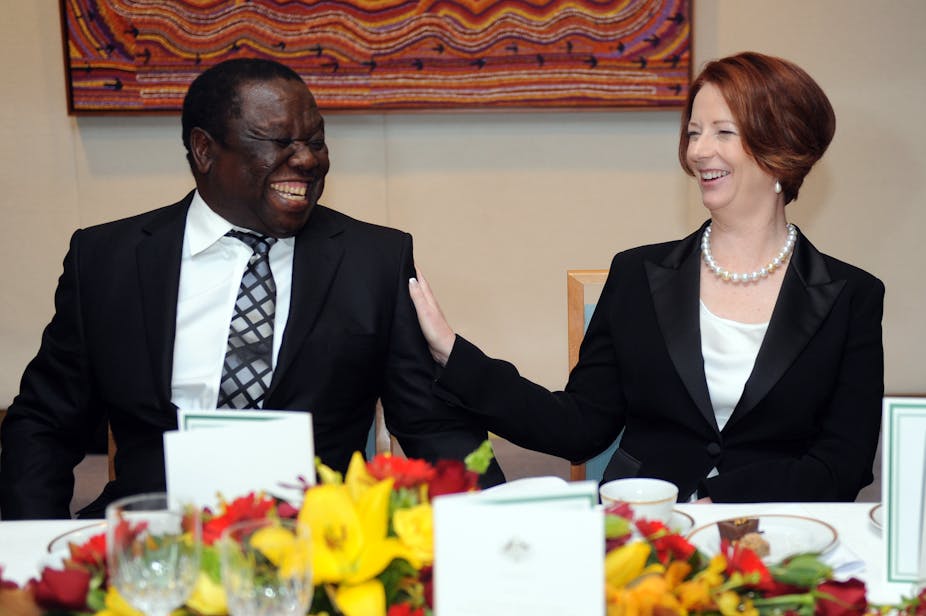In his recent visit to Australia, the prime minister of Zimbabwe, Morgan Tsvangirai, called for an end to sanctions against his country.
Australians may wonder why his Movement for Democratic Change (MDC) chose to call for the end of a policy that has given the party a competitive edge over an authoritarian regime traditionally known to employ violence, intimidation, blame games, procrastination and diversion. The MDC is currently in a compromise government with rival party Zimbabwe African National Union – Patriotic Front (ZANU-PF), led by the infamous Robert Mugabe.
One way of interpreting the call is to say that the MDC is exhausted, confirming the truth that you should never befriend a monster. Throughout Zimbabwe’s ongoing political crisis, the MDC has been insisting, among other things, that sanctions against the country are only “targeted sanctions” and do not apply to the general population. They argued that it is the responsibility of the ZANU-PF, not the MDC, to initiate political reforms to see the sanctions lifted.
Now Tsvangirai has shifted from talking about “targeted sanctions” to talking about “sanctions imposed on the country”. Why the sudden change? Many Australians may suspect that the Government of National Unity (GNU) has taken the valour out of the MDC as it now cedes to ZANU-PF’s demands. They may be right. The story of the GNU itself is not a happy one as it has not been able to fully meet the targets set by the Global Political Agreement (GPA).
But there have been some positive developments. Dollarisation has stabilised what is left of the economy, constitutional reform is at an advanced stage with a referendum expected later this year and national elections sometime next year. Two key bills have recently been passed on (human rights and electoral reform) and education, health and other social services have improved.
These developments add weight to what I discern to be the second dimension, that takes Tsvangirai’s recent campaign as a pragmatic, strategic decision to beat the opponent at his own game. The campaign not only highlights Zimbabwe’s case on the international scene, but it is also a claim of credit for recent positive developments.
So far, the responses to the campaign in Australia and New Zealand are very promising. The possibility of lifting the sanctions (or parts thereof) has been signalled. This will give Tsvangirai leverage as an internationally respected leader. His call to tie sanctions to the outcome of the forthcoming 2013 national elections is a strategic move to put pressure on ZANU-PF. It is an incentive for a free and fair outcome and a peaceful and stable post-election dispensation.
Tsvangirai has made this preemptive move to combat ZANU-PF’s insistence that sanctions are a threat to national sovereignty. If the sanctions are suspended now, part of Tsvangirai’s ammunition will be that the 2013 elections were held within a context of full and uncompromised national sovereignty. The campaign offers the MDC chance to confirm itself as an honest broker in the GPA.
In any contract, the party that fulfils its obligations has the temerity and vindication to stand up and accuse the other of not playing its part. This is not to suggest that there is unanimity about this campaign within the MDC. There are some who think that it is not the MDC’s job to clean ZANU-PF’s mess. After all, it’s likely that ZANU-PF will make a mockery of Tsvangirai’s campaign by saying that “the stooge” is begging “the master”.
Whichever way you take it, Tsvangirai has shown maturity by going beyond petty politics. He fully acknowledges the complexities surrounding any attempts at reconciliation. He is confronted with the issue of how to work together with individuals who preside over institutions that once traumatised him and that still victimise his supporters with impunity.
I take him to be saying that complex political situations require negotiation, give-and-take, and a critical act of balancing theory and practice. This is a form of pragmatism necessary for a political climate like Zimbabwe, where sticking to principles can pose the serious danger of derailing the gains achieved so far.
Tsvangirai is not oblivious to the ambiguities that shroud his campaign. He will know that it amounts to a policy inconsistency if not an embarrassment on the part of the MDC. It is undoing what gave them space for political action in the first place.
However, this is the cost that comes with entering into an agreement with an opponent such as ZANU-PF. The GPA is a compromise in the broadest sense of the word.
This understanding of compromise invokes the problem of “dirty hands” in politics: a realist view that considers as naïve all claims to govern “innocently”. This doesn’t mean that politicians cannot do what is right. Rather, though what is right may upset their deeply held convictions, they still have to act.
It should not be forgotten that core values and principles are constructed for an ideal world. Tsvangirai’s call is not a wanton betrayal, but a pragmatic strategy, aimed at achieving a democratic transition after three decades of authoritarianism and impunity.

